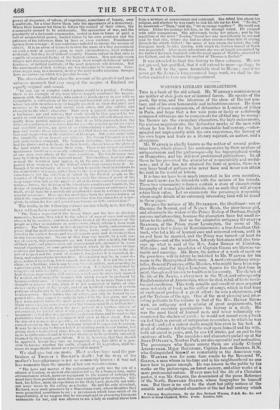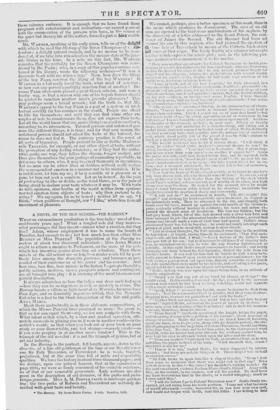WARNER'S LITERARY RECOLLECTIONS.
Tins is a book of the old school. Mr. WARNER'S reminiscences are neither of stale jests nor of damned farces. He speaks of the
good, the wise, and the laborious of the close of the last cen- tury, and of his own honourable and industrious career. He does not write of boon companions, of debauches in London, of follies in Paris, and hope that a few vain puns or lucky or sedulously composed witticisms are to compensate for all that may be wrong: his themes are the exemplary characters, the high endowments, the curious acquirements, the distinctive marks of the men with whom he has lived for the last remarkable half century,—inter- mingled not unpleasantly with his own experience, the history of his own hopes and fears as a literary aspirant, an author, and a clergyman.
Mr. WARNER is chiefly known as the author of several pedes- trian tours, which pleased his contemporaries by their mixture of antiquarianism and the picturesque—by his topographical works on Hampshire, and his diaTent professional publications. In all these he has preserved the character of respectability and useful- ness ; and if he has not attained the fame of genius, there is a very large band of authors who never have and never can attain his rank in the world of letters.
It is true we have been much interested in his own narrative, but much more (as he intended) with the notices of his friends. These two una.ssuming volumes contain a store of characteristic biography of remarkable individuals, and as such they will always retain their value. Let us enumerate the personages respecting whom ample details of an extremely interesting kind will be found in these pages. We pass the notices of Mr. Duxicaninr, the illegitimate son of GEORGE the Second, and of NANCY BEas, the poor-house girl, and afterwards the widow or the Prince Bishop of Durham, though curious and interesting, because the characters have but small re- lation to the public. Not so the admirable antiquary GUSTAVUS BRANDER, or the Priory (near Lymington, the scene of Mr. WARNER'S first volume of Reminiscences) ; a true Jonathan Old- buck, who led a life of learned ease and universal esteem, until in an evil hour he married, and the Priory was turned—at least its antiquities—out of the windows. Literary historians will also trea- sure up what is said of the Rev. JOHN BOWLE of Idmiston, Wiltshire ; and the anecdotes of Captain GROSE are likewise va- luable and amusing. Mr. BOTT, the author of a work of merit on the poor-laws. will in future be indebted to Mr. WARNER for his name in the Biographical Dictionary. A most extraordinary story- teller, General PERKINS, of the Marines, who might have been sup- posed the original of Major Longbow, figures for the first time in print, though well known to tradition in his county. The sketch of the life of Dr. JEANS, a clergyman in the West, and subsequently English minister at Amsterdam, where he died, is full of Mats to vir- tue and excellence. This truly amiable and excellent man acquired sonic notoriety at least, as the author of songs, which in that time of excitement produced a great effect: he was a clergyman, and yet the Tyiteus of flue age. One of the most pleasing and inter- esting portraits in the volume is that of the Rev. HENRY RICH.. MAN, an antiquary and a scholar of great acquirements, but of several eccentric peculiarities : his history is a study. He was the most timid of learned men, and never voluntarily en- countered the shadow of a risk ; he would not mount even a bank six feet high in pursuit of antiquarian researches, to which he was devoted ; and yet a violent death sought him even in his bed. A stack of chimnies fell through the roof upon himself and his wife, both advanced in years, and, by one fell stroke, put an end to the existence of both. The anecdotes and characters picked up at Sir JOHN D'OYLEY'S, Newton Park, are also agreeable and instructive. The personages who figure among them are chiefly Colonel ANSTRUTHER, Major ROCHFORT, Captain JOSIAH ROGERS, R.N. who distinguished himself so remarkably in the American war. Mr. WARNER was for some time curate to the Reverend W. GILPIN, a man whom in his time and in his neighbourhood no one knew how to praise enough. He was known to the public by his works on the picturesque, on forest scenery, and other works of a more professional nature. If ever man led the life of a Christian pastor, it was Mr. GILPIN, the descendant of the pious Reformer of the North, BERNARD GILPIN, whose biographer he himself was. But there is no end to the short but pithy notices of the amiable and enlightened characters of the last half century which • Literary Recollections. By the Rev. Richard Warner, F.A.S. &c. &c. amid Rector of Great Chatfield, Wilts. 2 vols. London, IWO. these volumes embrace. It is enough that we have found them pregnant with entertainment and instruction—we cannot p oceed with the enumeration of the persons who have, in the course of the quiet but literary life of the author, formed apart ol his 0 wiable circle. Mr. WARNER, speaking of his early years, tells us of the delight with which he read the History of the Seven Champions of C, ris- tendom ; a delight natural enough, and by no means to be won- dered at, if we take into consideration the meagre state of the juve- nile library in his time. In a note on this titct, Mr. WARNER remarks, that his partiality for the Seven Champions was sanc- tioned by Dr. PARR; V;110, in a copy of this popular romance con- tained in his library, wrote the following sentence—" It was a favourite book with me when a boy." Now, how does the liking of the boy PARR sanction the liking of the boy WARNER? If WARNER as a lad really loved the book, what need of sanction: or how can one person's partiality sanction that of another ? Be- cause PARR afterwards proved a great Greek scholar, and wore a bushy wig, is that a reason why one of his boyish fancies should be quoted to sanction another man's juvenile pleasures ? This may perhaps seem a trivial remark ; but the truth is, that me WARNER'S appeal to the boy PARR is a part of a system of intel- lectual servility far too common in the world. People are afraid to like for themselves ; and until they can find some other ex- amples of note to countenance them, dare not express their taste. Let all the world know that one man's liking is as good as another's, according to its intenseness. Tutored persons and untutored per- sons like different things, it is true ; and for that very reason, the untutored person should not adopt the taste of the tutored, be- cause he does not feel it. The contrary practice is the worst of an sorts of hypocrisy. People pretend to like or dislike Mademoi- selle TAGLIONI, for example, or any other object of taste, without the perception of any feeling whatever ; or if they find the autho- rities going one way, they follow the stream, bong,r6 nialgrt% and thus give themselves the pain perhaps of concealing a portiality, in deference to others, who, it may be, excel them only in impudence. Let no man say he either likes or dislikes, without really feeling- the correspondent emotion in a manner not to be mistaken. If he is indifferent, let hiin say so ; if he is sensible of a pleasure or a pain, let him not seek a sanction. Let us be honest. As the pain of retendinke to like or dislike as the wind blows, so is the pain of being afraid to declare your taste whatever it may be. With taste as with opinions, nine tenths of the world neither form opinions nor feel emotion from objects of taste ; why then pretend to do either? We say again, let us be honest; neither let us say, " think," when guiltless of thought, nor "I like," when free from all movement of pleasure.



























 Previous page
Previous page